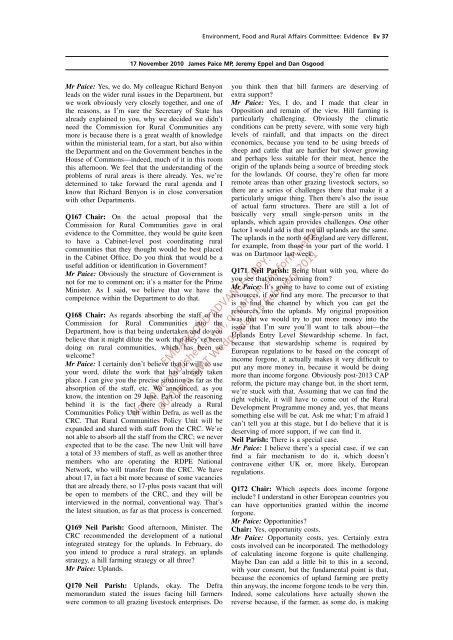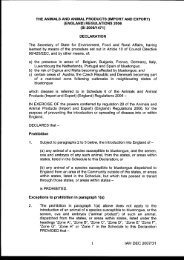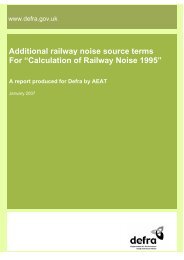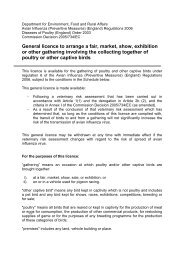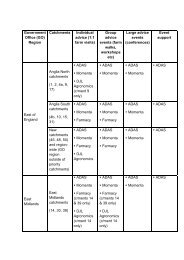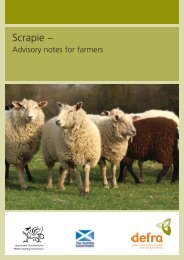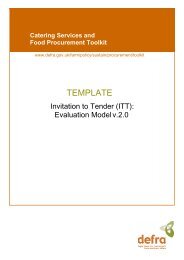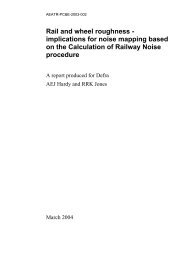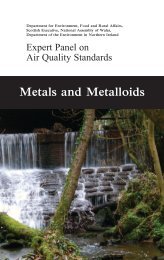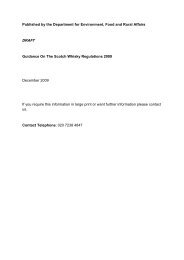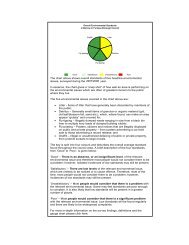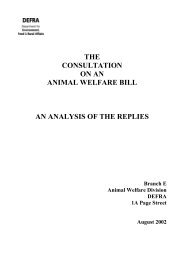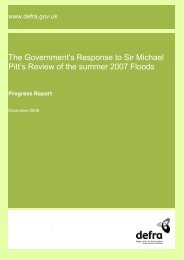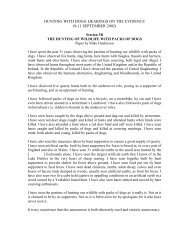Farming in the Uplands - ARCHIVE: Defra
Farming in the Uplands - ARCHIVE: Defra
Farming in the Uplands - ARCHIVE: Defra
You also want an ePaper? Increase the reach of your titles
YUMPU automatically turns print PDFs into web optimized ePapers that Google loves.
Environment, Food and Rural Affairs Committee: Evidence Ev 37<br />
17 November 2010 James Paice MP, Jeremy Eppel and Dan Osgood<br />
Mr Paice: Yes, we do. My colleague Richard Benyon<br />
leads on <strong>the</strong> wider rural issues <strong>in</strong> <strong>the</strong> Department, but<br />
we work obviously very closely toge<strong>the</strong>r, and one of<br />
<strong>the</strong> reasons, as I’m sure <strong>the</strong> Secretary of State has<br />
already expla<strong>in</strong>ed to you, why we decided we didn’t<br />
need <strong>the</strong> Commission for Rural Communities any<br />
more is because <strong>the</strong>re is a great wealth of knowledge<br />
with<strong>in</strong> <strong>the</strong> m<strong>in</strong>isterial team, for a start, but also with<strong>in</strong><br />
<strong>the</strong> Department and on <strong>the</strong> Government benches <strong>in</strong> <strong>the</strong><br />
House of Commons—<strong>in</strong>deed, much of it <strong>in</strong> this room<br />
this afternoon. We feel that <strong>the</strong> understand<strong>in</strong>g of <strong>the</strong><br />
problems of rural areas is <strong>the</strong>re already. Yes, we’re<br />
determ<strong>in</strong>ed to take forward <strong>the</strong> rural agenda and I<br />
know that Richard Benyon is <strong>in</strong> close conversation<br />
with o<strong>the</strong>r Departments.<br />
Q167 Chair: On <strong>the</strong> actual proposal that <strong>the</strong><br />
Commission for Rural Communities gave <strong>in</strong> oral<br />
evidence to <strong>the</strong> Committee, <strong>the</strong>y would be quite keen<br />
to have a Cab<strong>in</strong>et-level post coord<strong>in</strong>at<strong>in</strong>g rural<br />
communities that <strong>the</strong>y thought would be best placed<br />
<strong>in</strong> <strong>the</strong> Cab<strong>in</strong>et Office. Do you th<strong>in</strong>k that would be a<br />
useful addition or identification <strong>in</strong> Government?<br />
Mr Paice: Obviously <strong>the</strong> structure of Government is<br />
not for me to comment on; it’s a matter for <strong>the</strong> Prime<br />
M<strong>in</strong>ister. As I said, we believe that we have <strong>the</strong><br />
competence with<strong>in</strong> <strong>the</strong> Department to do that.<br />
Q168 Chair: As regards absorb<strong>in</strong>g <strong>the</strong> staff of <strong>the</strong><br />
Commission for Rural Communities <strong>in</strong>to <strong>the</strong><br />
Department, how is that be<strong>in</strong>g undertaken and do you<br />
believe that it might dilute <strong>the</strong> work that <strong>the</strong>y’ve been<br />
do<strong>in</strong>g on rural communities, which has been so<br />
welcome?<br />
Mr Paice: I certa<strong>in</strong>ly don’t believe that it will, to use<br />
your word, dilute <strong>the</strong> work that has already taken<br />
place. I can give you <strong>the</strong> precise situation as far as <strong>the</strong><br />
absorption of <strong>the</strong> staff, etc. We announced, as you<br />
know, <strong>the</strong> <strong>in</strong>tention on 29 June. Part of <strong>the</strong> reason<strong>in</strong>g<br />
beh<strong>in</strong>d it is <strong>the</strong> fact <strong>the</strong>re is already a Rural<br />
Communities Policy Unit with<strong>in</strong> <strong>Defra</strong>, as well as <strong>the</strong><br />
CRC. That Rural Communities Policy Unit will be<br />
expanded and shared with staff from <strong>the</strong> CRC. We’re<br />
not able to absorb all <strong>the</strong> staff from <strong>the</strong> CRC; we never<br />
expected that to be <strong>the</strong> case. The new Unit will have<br />
a total of 33 members of staff, as well as ano<strong>the</strong>r three<br />
members who are operat<strong>in</strong>g <strong>the</strong> RDPE National<br />
Network, who will transfer from <strong>the</strong> CRC. We have<br />
about 17, <strong>in</strong> fact a bit more because of some vacancies<br />
that are already <strong>the</strong>re, so 17-plus posts vacant that will<br />
be open to members of <strong>the</strong> CRC, and <strong>the</strong>y will be<br />
<strong>in</strong>terviewed <strong>in</strong> <strong>the</strong> normal, conventional way. That’s<br />
<strong>the</strong> latest situation, as far as that process is concerned.<br />
Q169 Neil Parish: Good afternoon, M<strong>in</strong>ister. The<br />
CRC recommended <strong>the</strong> development of a national<br />
<strong>in</strong>tegrated strategy for <strong>the</strong> uplands. In February, do<br />
you <strong>in</strong>tend to produce a rural strategy, an uplands<br />
strategy, a hill farm<strong>in</strong>g strategy or all three?<br />
Mr Paice: <strong>Uplands</strong>.<br />
Q170 Neil Parish: <strong>Uplands</strong>, okay. The <strong>Defra</strong><br />
memorandum stated <strong>the</strong> issues fac<strong>in</strong>g hill farmers<br />
were common to all graz<strong>in</strong>g livestock enterprises. Do<br />
you th<strong>in</strong>k <strong>the</strong>n that hill farmers are deserv<strong>in</strong>g of<br />
extra support?<br />
Mr Paice: Yes, I do, and I made that clear <strong>in</strong><br />
Opposition and rema<strong>in</strong> of <strong>the</strong> view. Hill farm<strong>in</strong>g is<br />
particularly challeng<strong>in</strong>g. Obviously <strong>the</strong> climatic<br />
conditions can be pretty severe, with some very high<br />
levels of ra<strong>in</strong>fall, and that impacts on <strong>the</strong> direct<br />
economics, because you tend to be us<strong>in</strong>g breeds of<br />
sheep and cattle that are hardier but slower grow<strong>in</strong>g<br />
and perhaps less suitable for <strong>the</strong>ir meat, hence <strong>the</strong><br />
orig<strong>in</strong> of <strong>the</strong> uplands be<strong>in</strong>g a source of breed<strong>in</strong>g stock<br />
for <strong>the</strong> lowlands. Of course, <strong>the</strong>y’re often far more<br />
remote areas than o<strong>the</strong>r graz<strong>in</strong>g livestock sectors, so<br />
<strong>the</strong>re are a series of challenges <strong>the</strong>re that make it a<br />
particularly unique th<strong>in</strong>g. Then <strong>the</strong>re’s also <strong>the</strong> issue<br />
of actual farm structures. There are still a lot of<br />
basically very small s<strong>in</strong>gle-person units <strong>in</strong> <strong>the</strong><br />
uplands, which aga<strong>in</strong> provides challenges. One o<strong>the</strong>r<br />
factor I would add is that not all uplands are <strong>the</strong> same.<br />
The uplands <strong>in</strong> <strong>the</strong> north of England are very different,<br />
for example, from those <strong>in</strong> your part of <strong>the</strong> world. I<br />
was on Dartmoor last week.<br />
Q171 Neil Parish: Be<strong>in</strong>g blunt with you, where do<br />
you see that money com<strong>in</strong>g from?<br />
Mr Paice: It’s go<strong>in</strong>g to have to come out of exist<strong>in</strong>g<br />
resources, if we f<strong>in</strong>d any more. The precursor to that<br />
is to f<strong>in</strong>d <strong>the</strong> channel by which you can get <strong>the</strong><br />
resources <strong>in</strong>to <strong>the</strong> uplands. My orig<strong>in</strong>al proposition<br />
was that we would try to put more money <strong>in</strong>to <strong>the</strong><br />
issue that I’m sure you’ll want to talk about—<strong>the</strong><br />
<strong>Uplands</strong> Entry Level Stewardship scheme. In fact,<br />
because that stewardship scheme is required by<br />
European regulations to be based on <strong>the</strong> concept of<br />
<strong>in</strong>come forgone, it actually makes it very difficult to<br />
put any more money <strong>in</strong>, because it would be do<strong>in</strong>g<br />
more than <strong>in</strong>come forgone. Obviously post-2013 CAP<br />
reform, <strong>the</strong> picture may change but, <strong>in</strong> <strong>the</strong> short term,<br />
we’re stuck with that. Assum<strong>in</strong>g that we can f<strong>in</strong>d <strong>the</strong><br />
right vehicle, it will have to come out of <strong>the</strong> Rural<br />
Development Programme money and, yes, that means<br />
someth<strong>in</strong>g else will be cut. Ask me what; I’m afraid I<br />
can’t tell you at this stage, but I do believe that it is<br />
deserv<strong>in</strong>g of more support, if we can f<strong>in</strong>d it.<br />
Neil Parish: There is a special case.<br />
Mr Paice: I believe <strong>the</strong>re’s a special case, if we can<br />
f<strong>in</strong>d a fair mechanism to do it, which doesn’t<br />
contravene ei<strong>the</strong>r UK or, more likely, European<br />
regulations.<br />
EMBARGOED ADVANCE COPY:<br />
Not to be published <strong>in</strong> full, or part, <strong>in</strong> any form before<br />
00.01am GMT Wednesday 16 February 2011<br />
Q172 Chair: Which aspects does <strong>in</strong>come forgone<br />
<strong>in</strong>clude? I understand <strong>in</strong> o<strong>the</strong>r European countries you<br />
can have opportunities granted with<strong>in</strong> <strong>the</strong> <strong>in</strong>come<br />
forgone.<br />
Mr Paice: Opportunities?<br />
Chair: Yes, opportunity costs.<br />
Mr Paice: Opportunity costs, yes. Certa<strong>in</strong>ly extra<br />
costs <strong>in</strong>volved can be <strong>in</strong>corporated. The methodology<br />
of calculat<strong>in</strong>g <strong>in</strong>come forgone is quite challeng<strong>in</strong>g.<br />
Maybe Dan can add a little bit to this <strong>in</strong> a second,<br />
with your consent, but <strong>the</strong> fundamental po<strong>in</strong>t is that,<br />
because <strong>the</strong> economics of upland farm<strong>in</strong>g are pretty<br />
th<strong>in</strong> anyway, <strong>the</strong> <strong>in</strong>come forgone tends to be very th<strong>in</strong>.<br />
Indeed, some calculations have actually shown <strong>the</strong><br />
reverse because, if <strong>the</strong> farmer, as some do, is mak<strong>in</strong>g


